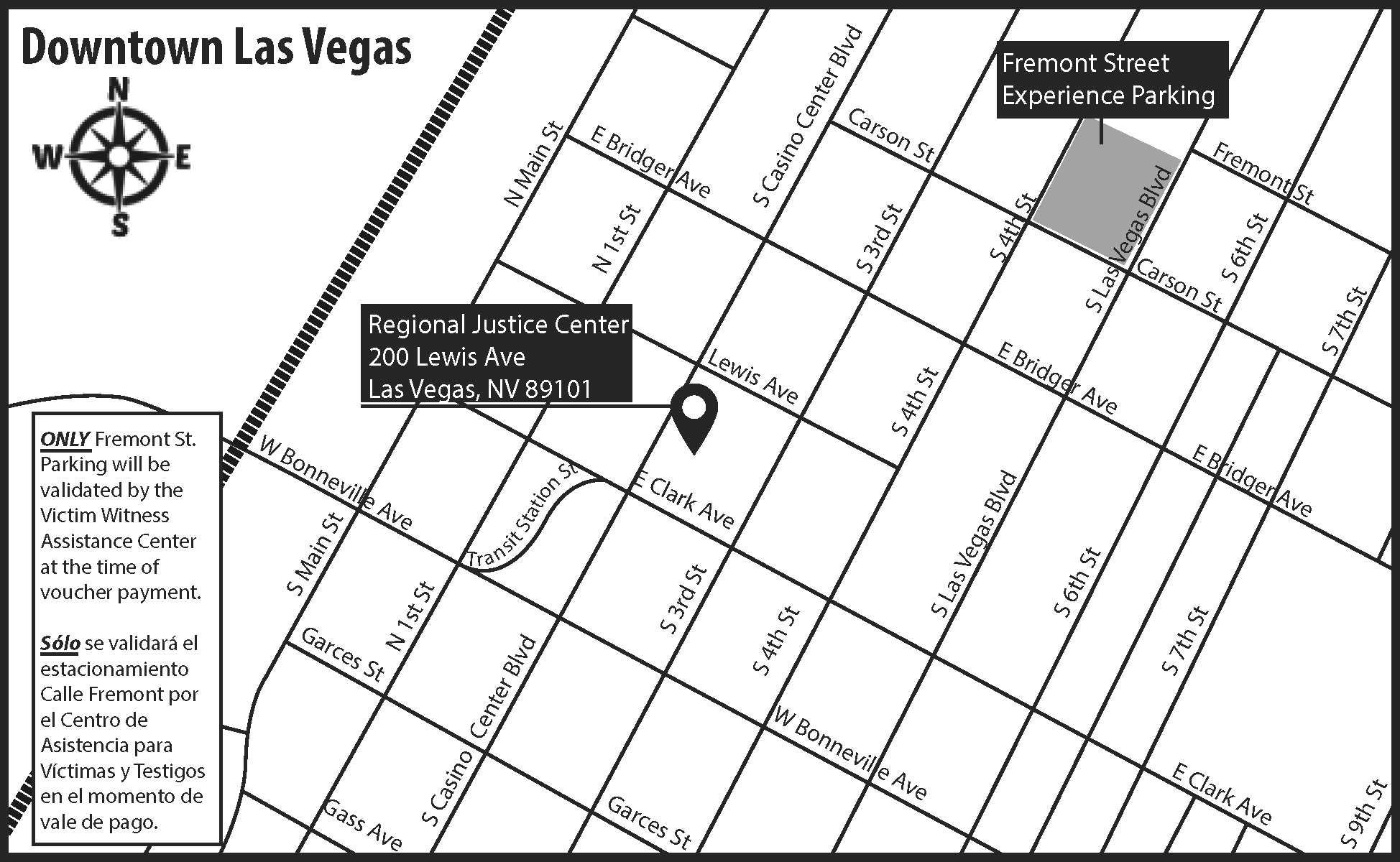
If you are in immediate danger, please call 911
For resources 24 hours a day, please call Safe Nest at 1-702-646-4981 or visit the Safe Nest website at www.safenest.org
Frequently Asked Questions
- If you have received a subpoena, make sure to attend Court on the date specified and be on time. Do not bring your children to Court.
- The Subpoena will be for a trial or a preliminary hearing. A trial will be decided by a jury or the judge. A preliminary hearing is a hearing that takes place to determine if there is enough evidence to move on to a jury trial.
- Once you are in Court, tell the truth, be courteous, and do not talk to the Defendant.
Our office can assist with that, please contact the Clark County Victim Witness Assistant center at 702-671-2525 or notify the process server.
Yes. You must come to Court if you have received a subpoena. Failure to do so can result in a warrant for your arrest.
Bring any evidence with you that you want the prosecutor to see. This can include videos or photos, text messages, emails, voice mails, etc.
If the Defendant contacts you and there is a no contact order in place, please contact Clark County Victim Witness Assistant Center at 702-671-2525 as soon as possible so that we can address the issue with the Judge. Bring any evidence of the unlawful contact with you to Court or save it so you can email it to the victim advocate.
You also have the option of obtaining a protective order against the Defendant which would prevent the Defendant from being able to contact you or come near you.
If you are being threatened, please notify the advocate or the prosecuting attorney. If any crimes such as break-ins or further harm have been committed against you, please file a police report.
Once you are in Court, our office can keep you separated from the Defendant and in a different room while speaking with the prosecuting attorney to make sure you feel safe. There will also be a Court Marshal present to ensure that you feel safe while in the courtroom.
The subpoena you received should have the name of the prosecuting attorney listed. If you are still unsure who the prosecuting attorney is, you can call the DA Victim Advocate (702-671-2525).
Yes. You can request to speak with the prosecutor at any time while you are in Court. You will also speak with an advocate. The purpose of this meeting will be to let the prosecutor and the state know what you want to happen in the case and to answer any questions you may have about the process.
The prosecutor will always take what you want into consideration, but it will be ultimately the decision of the prosecutor to determine what type of offer to make on the case. Types of punishment can be a probation period, counseling sessions for anger, domestic violence, alcohol or drug abuse, fines, community service, and/or jail or prison time.
Once you check in, you will speak to the victim advocate and the prosecuting attorney. You will have the opportunity to show them any photos or evidence you have brought with you to Court, to ask any questions you may have, and to let them know what you want to happen in the case.
If the case negotiates and the Defendant takes a plea deal, you will not have to testify. If that does not happen and the hearing goes forward, you may have to testify.
In Nevada, a victim does not have the power to “drop” the charge. A criminal case involves a crime against the State of Nevada, not a particular victim. The prosecuting attorney represents the State of Nevada. Charges will be “dropped” only if the prosecuting attorney is convinced it is in the best interest of the State of Nevada to do so.
The victim advocate can discuss assistance programs with you for financial need, mental health need, and other types of assistance you may need.
If you are unable to attend Court, let the process server know right away. There may be a chance we can reschedule the hearing. You would need to show proof of a conflict.
The victim advocate can assist with this. Please also see the link below for information on how to file a temporary protective order.
Helpful Links
Look Up My Case
For information on a case in Las Vegas Justice Court click the link below.
Domestic Violence Courtrooms
Regional Justice Center
200 Lewis Avenue
Las Vegas, Nevada 89101
Domestic Violence Departments are JC15 and JC1, both located on the 6th floor
DA Advocate
Victim Advocate
DA Victim Witness Assistance Center
(702) 671-2525
For further information on Victim Rights and Responsibilities, please click the link below.
Other Resources
Safe Nest: www.safenest.org
National Domestic Violence Hotline
1-800-799-SAFE (7233)
Nevada Victims of Crimes: www.voc.nv.gov
Nevada Domestic Violence Law – NRS 200.485
www.leg.state.nv.us/NRS/NRS-200.html#NRS200Sec485
Temporary Protective Order (TPO)/Protective Order Information
Family Law Self Help Center 702-455-1500
https://www.familylawselfhelpcenter.org/forms/dv-protection-order-forms
For information on where to file for different protection orders (provided by Legal Aid): Click Here.
TPO information/Court Clerk 702-455-3400
To submit a TPO application directly to the Court email to:
tpocom@clarkcountycourts.us
To get a copy of a granted TPO send request to:
tpoprotem@clarkcountycourts.us
To check on service of a TPO 702-455-3400 or Sheriff's Civil Service 702-455-5400
To verify telephonic appearance for extension hearings call TPO clerk at 702-455-2434
Maps
